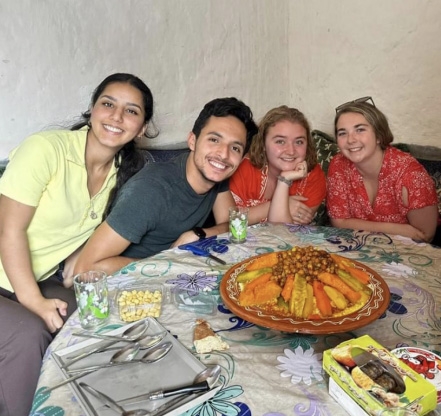Major: French, Chemistry minor
Study abroad term, year and location: Rennes, France and Rabat/Marrakech, Morocco; Fall 2022
What is a favorite memory from studying abroad?
My favorite memory from studying abroad is that one time I was doing homework in a cafe and a man came inside and sprayed me and the other person inside with copious amounts of cologne without saying a word. He left promptly after. I did not end up finishing my coffee or croissant because it was doused with a very strong cologne, but it was such a shocking and funny experience that I didn't even mind.
What are some of your favorite accomplishments from your study abroad experience?
I am proud of the random friendships I made in France. I would do homework at the same cafe almost every morning and this elderly woman would be there as well. Finally, I decided to talk to her because we were always there at the same time and we ended up getting along really well. She told me that on sunny days she gets a regular croissant and on rainy days she gets a chocolate croissant.
What is a challenge you overcame?
I was incredibly challenged by soft cheeses. Something about soft, fragrant cheeses made me squeamish, so a goal of mine was to enjoy soft cheese. I tried camembert cheese back in 2018 and really didn't like it, so I wanted to work my way slowly up to trying camembert again. I am extremely proud to say that I did just that! And more, I enjoyed it. It took 3.5 months to do that.
Advice for women on International Women's Day?
My advice for Women on International Women's Day is to be kind and supportive to one another and try to understand that everyone has a different life experience. Studying abroad really helped me shape my take on feminism and how I want to
What is the attitude towards gender in the host country?
In France, there was definitely a way women were expected to be. In general, people dressed a lot more formally in France, so women were expected to look put together and made up every time they left the house. In fact, I did not wear sweatpants out once while I was in France. Being back in the US, I have resorted to my old ways. I noticed that attitudes toward gender seemed to be based on generation in Morocco. For example, it seemed like younger women in Morocco were able to get an education whereas middle-aged and older women may not have had that same opportunity.
What are the typical gender roles in the host country?
The gender roles in France were comparable to the United States, although I observed many women doing traditional roles. My host mom always cooked dinner and cleaned, even if she had a really long day. My host dad was not well versed in the kitchen and worked long hours at his day job than my host mom. In Morocco, the majority of women were expected to cook, clean, and welcome guests. They also acted as the wisdom of the house. When conflicts come up or another member of the family needs advice, they go to the eldest woman. What are the cultural expectations for men and women in my host country?
In Morocco, wearing a hijab was optional, although there was societal pressure to wear one. Hafsa, the woman we were with, was a practicing Muslim and did not wear a hijab. She did say that she had friends who would wear their hijab in the house but take it off once they left their parents' gaze. She also has other friends who wear the hijab and find great joy and value in wearing it. Either way was acceptable. As my host mom in Morocco said, the choice to wear a hijab is between the woman and Allah (aka, it is no one else's business).
What are the gender stereotypes of Americans in the host country?
The gender stereotypes of Americans in my host country included being carefree, loud, greedy, and friendly. When people learned that we were American, most people would be excited.
How do men treat women in the host country?
In France, men treated women almost like women are treated in the US. There was a certain degree of man-splaining I experienced; for example, a man asked me what we call the fan above the stove (in kitchens) in English, so I told him "a fan." He fact-checked me on google and told me that it was actually called a "fume hood". That is a specific example, but in general, there was a good amount of this sort of conversation. In Morocco, my friends and I experienced a lot of cat-calling. It was very excessive and not something we expected. We had lunch in a small village outside Marrakech where we had a conversation with a family about what their life was like. The grandmother of the household told us that she did not work because she was a woman (in fact, she did lots of work, but her definition did not include household chores, which were much more extensive than household chores in the US). She told us that she was involved in an arranged marriage at ~thirteen or fourteen years old (she does not know her exact birthday/year).
What are the cultural norms regarding friendship and dating?
In France, it was popular to go to bars and congregate with friends; being at a bar did not necessarily entail drinking. I don't have much to say in regards to dating, but it seemed like a very casual and typical thing to do. In Morocco, we were with two students (one male, one female) who helped paint a more accurate picture of life for a young person in the country. Ayoub, the man with us, shared that if he brings a woman to his parents, there is a certain expectation to wed. Hafsa, the woman with us, shared that she does not bring home men that she dates.
How do my personal values compare with my host country’s attitudes about socially accepted gender roles?
This is a tricky question because I was able to find my personal values in both countries I visited. In France, I participated in a women's march with my friend which was great, and in Morocco, I talked to so many caring, strong, and intelligent women. I was inspired by both of these countries and I think after being in both of those places, my personal values are more enriched and holistic. Even though Morocco was much more traditional with gender roles, women still exhibited impressive strengths that really inspired me to expand my definition of feminism.

